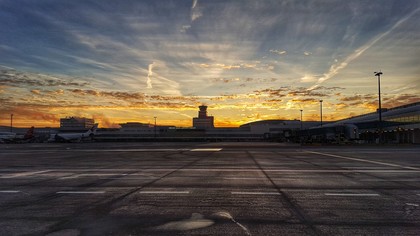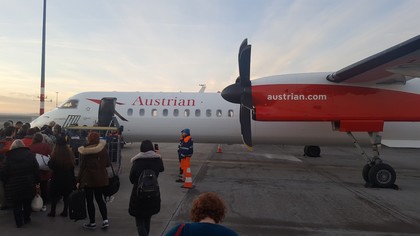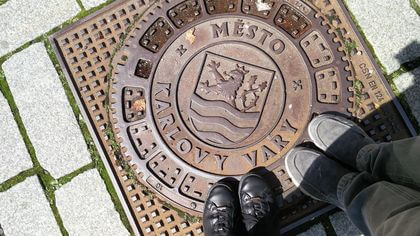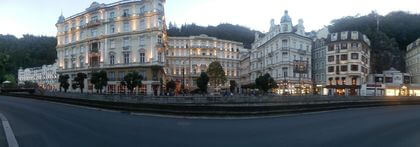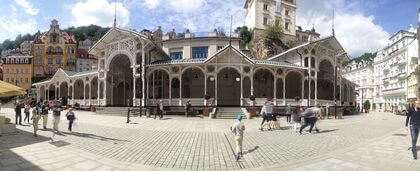Czechia

More details
The Czech Republic ( CHEK-rə-PUB-lik; Czech: Česká republika, Czech pronunciation: [ˈt͡ʃɛskaː ˈrɛpuˌblɪka]), also known as Czechia (, CHEK-ee-ə; Czech: Česko, pronounced [ˈt͡ʃɛsko]), is a nation state in Central Europe bordered by Germany to the west, Austria to the south, Slovakia to the east and Poland to the northeast. The Czech Republic covers an area of 78,866 square kilometres (30,450 sq mi) with a mostly temperate continental climate and oceanic climate. It is a unitary parliamentary republic, has 10.5 million inhabitants and the capital and largest city is Prague, with over 1.2 million residents. The Czech Republic includes the historical territories of Bohemia, Moravia, and Czech Silesia.
The Czech state was formed in the late 9th century as the Duchy of Bohemia under the Great Moravian Empire. After the fall of the Empire in 907, the centre of power transferred from Moravia to Bohemia under the Přemyslid dynasty. In 1002, the duchy was formally recognized ...
as part of the Holy Roman Empire, becoming the Kingdom of Bohemia in 1198 and reaching its greatest territorial extent in the 14th century. Besides Bohemia itself, the king of Bohemia ruled the lands of the Bohemian Crown, he had a vote in the election of the Holy Roman Emperor, and Prague was the imperial seat in periods between the 14th and 17th century. In the Hussite wars of the 15th century driven by the Protestant Bohemian Reformation, the kingdom faced economic embargoes and defeated five consecutive crusades proclaimed by the leaders of the Roman Catholic Church.
Following the Battle of Mohács in 1526, the whole Crown of Bohemia was gradually integrated into the Habsburg Monarchy alongside the Archduchy of Austria and the Kingdom of Hungary. The Protestant Bohemian Revolt (1618–20) against the Catholic Habsburgs led to the Thirty Years' War. After the Battle of the White Mountain, the Habsburgs consolidated their rule, eradicated Protestantism and reimposed Roman Catholicism, and also adopted a policy of gradual Germanization. With the dissolution of the Holy Roman Empire in 1806, the Bohemian Kingdom became part of the Austrian Empire and the Czech language experienced a revival as a consequence of widespread romantic nationalism. In the 19th century, the Czech lands became the industrial powerhouse of the monarchy and were subsequently the core of the Republic of Czechoslovakia, which was formed in 1918 following the collapse of the Austro-Hungarian Empire after World War I.
The Czech part of Czechoslovakia was occupied by Germany in World War II, and was liberated in 1945 by the armies of the Soviet Union and the United States. The Czech country lost the majority of its German-speaking inhabitants after they were expelled following the war. The Communist Party of Czechoslovakia won the 1946 elections. Following the 1948 coup d'état, Czechoslovakia became a one-party communist state under Soviet influence. In 1968, increasing dissatisfaction with the regime culminated in a reform movement known as the Prague Spring, which ended in a Soviet-led invasion.
The first separate Czech republic was created on 1 January 1969, under the name Czech Socialist Republic within federalization of Czechoslovakia, however the federalization was implemented only incompletely. Czechoslovakia remained occupied until the 1989 Velvet Revolution, when the communist regime collapsed and a democracy and federalization was deepened. On 6 March 1990, the Czech Socialist Republic was renamed to the Czech Republic. On 1 January 1993, Czechoslovakia peacefully dissolved, with its constituent states becoming the independent states of the Czech Republic and the Slovak Republic.
The Czech Republic joined NATO in 1999 and the European Union (EU) in 2004; it is a member of the United Nations, the OECD, the OSCE, and the Council of Europe. It is a developed country with an advanced, high income economy and high living standards. The UNDP ranks the country 14th in inequality-adjusted human development. The Czech Republic also ranks as the 6th most peaceful country, while achieving strong performance in democratic governance. It has the lowest unemployment rate of EU members.
Source: wikipedia
Map
Regions 14
Flights
Most visited cities
Nearby upcoming and completed trips
| 8.3.2024 - 9.3.2024 | |
| 31.8.2018 - 2.9.2018 |

